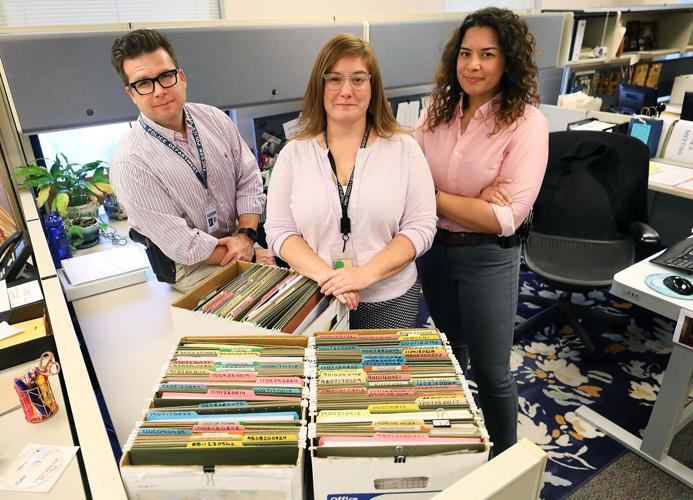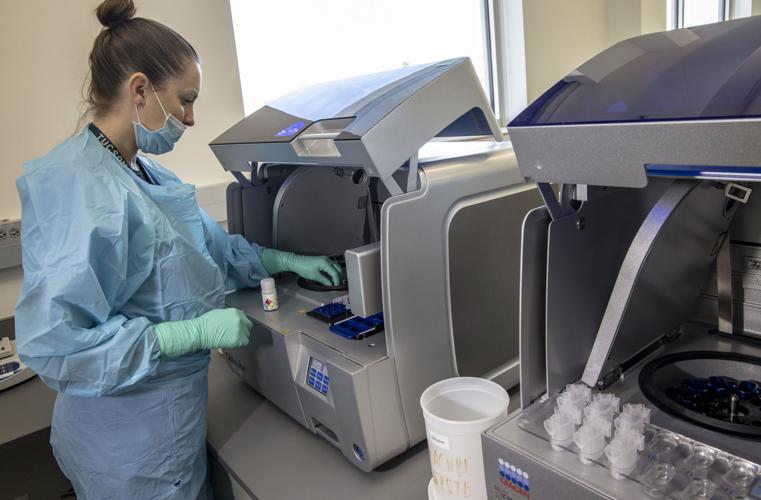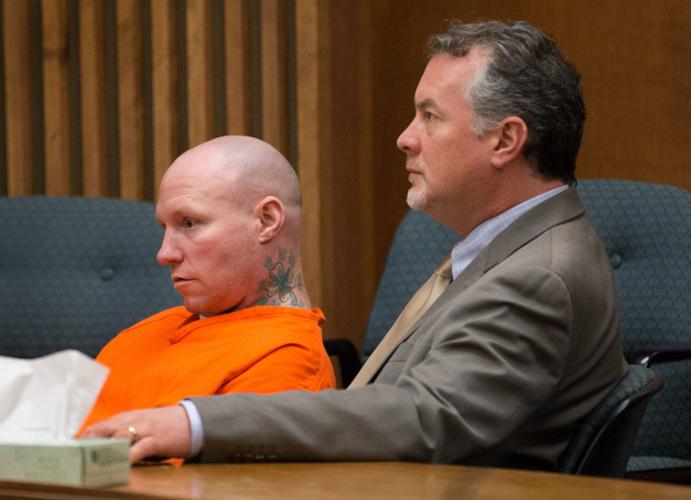It starts with an apology.
On Aug. 22, 2017, Tucson police detectives re-interviewed the survivor of a 2002 sexual assault, apologizing first, then listening as the woman recounted details of the attack she endured as an 18-year-old.
The woman told them that on Sept. 1, 2002, Ramon Pena, then 19, held her down on a bed in an apartment and sexually assaulted her, court documents show.
The woman managed to escape from Pena and was taken to the apartment’s security office by a Samaritan. Officers searched the area, but Pena was gone. The woman was taken to a nearby hospital and underwent a sexual assault exam, which revealed physical injuries.
Detectives later located Pena in Laredo, Texas, and he told them he was getting ready to leave for the military. He told police the sex was consensual, and during a confrontation call a few days later denied hearing the woman tell him “no” and offered other excuses for his behavior.
“To detectives, it appeared the two agreed the entire episode was a misunderstanding,” court documents say of the 2002 call, and a few days later, the woman called to say she didn’t want to press charges. The case was closed.
Fast-forward to 2017, when the woman’s sexual assault kit was finally processed under a federal grant, causing the case to be reopened.
While all the recordings made during the initial investigation had been destroyed, detectives re-interviewed the woman, who pointed out several inaccuracies in the previous detective’s report as well as new details.
She told police that she spoke to Pena in Spanish and the original detectives in English, but “there was no way anyone could misunderstand” that she had made it clear she did not consent to having sex with Pena.
Detectives called Pena, who was living in Chicago after leaving the military on an “other than honorable” discharge. In the years since his separation, he’d also racked up two felony and three misdemeanor convictions, one for a violent and sexually motivated act, court documents show.
When detectives called Pena in December 2017, he claimed the woman was “fine” with having sex and said, “I thought we ended up with her saying she was lying? I know I didn’t do anything wrong.”
Detectives told him they were preparing a warrant for his arrest and in November 2018 — more than 16 years after the woman first told her story to police — Pena was booked into the Pima County jail on a single charge of sexual assault.
Pena fought the charge for years, until his June 2020 trial was put on hold because of the pandemic. In August, he pleaded guilty to aggravated assault on an incapacitated victim and was sentenced to probation.
The woman said she’s had persistent symptoms that include depression, loss of sleep, anxiety and fear, according to a victim impact statement filed in court.
She also said that as so much time had passed since the assault, she did not know “that she would ever see justice.”
This woman was one of some 130 sexual assault survivors who have now gotten answers from Tucson police about their cases, even though it often has taken years, under a federal grant that funds testing of backlogged sexual assault kits.
In September of 2019, Pima County was awarded $2 million as part of the Bureau of Justice Affairs National Sexual Assault Kit Initiative, or SAKI, grant. The funds came on the heels of a $1 million grant in 2015, that helped the Tucson Police Department tackle its backlog of nearly 2,000 sexual assault kits.
When TPD finished testing the 1,900 kits, the end result was 915 DNA profiles that generated 464 hits, which means the identity of a potential suspect is revealed. One of those suspects was Nathan Loebe, who was sentenced to 274 years in prison in 2019 after he was convicted of 12 counts of sexual assault, five counts of kidnapping, three counts of stalking and one count of attempted sexual assault. Several women were victimized by Loebe between 2003 and 2015, but their cases went unsolved until law enforcement was able to build a case using DNA evidence obtained from kits tested under the DANY grant.
The grant also allowed for the hiring of two victim advocates at the Pima County Attorney’s Office to assist police with victim notification and support.
The 2019 SAKI grant, which has allowed TPD to continue its work on these cold cases, are a bit more involved, with funding supporting teams that test unsubmitted kits; collect and test DNA from offenders; produce protocols and procedures to improve collaboration among police, labs, prosecutors and victim support providers; create resources to assist survivors during the investigation and prosecution process; and enhance victim notification protocols and services.
The money is shared by the County Attorney’s Office, TPD and the Sheriff’s Department. It funds the salaries of four detectives, two sergeants, two prosecutors and four advocates.
The team meets regularly to review cases, and the results of the collaboration have been eye-opening on both sides, according to victim advocate Colleen Phelan.
“Law enforcement has seen how helpful advocates can be in the process,” said Phelan, who added that advocates help facilitate conversations between victims and detectives.
TPD Cold Case Sexual Assault unit detectives Mary Pekas and Dallas Wilson agree, saying that these days, when they notify victims of activity in the case, “we pretty much lead with an apology.”
The initial apology for showing up at their door is followed by more apologies — either that it took so long for police to contact the victim, or even for how that victim was treated when he or she first reported the assault. Detectives say these apologies are often better received with an advocate on hand to help the victim process his or her feelings and offer options for support.
‘Fixing what we should have done’
At the start of 2020, project participants hunkered down for a SAKI boot camp, spending the week building protocols and figuring out the best way to make notifications in these delicate situations.The group quickly decided that in-person notifications were important, Phelan said.
Other notifications “didn’t allow a survivor a chance to ask questions or see us,” Phelan said. “When you’ve been failed by the system, you are not going to so easily trust a voice at the end of the phone.”
Notifications had to happen in person and lead with the appropriate apology for each situation.
“The apology for me is one of most important pieces of notification,” Phelan said. “For years, survivors have rightfully felt ignored and minimized by the system, through law enforcement or the county attorney. The criminal justice system has not served survivors.”
The grants have focused on people trying to do better and figure out where the system failures happened years ago, and “fixing what we should have done,” Phelan said.
In February 2020, the group got started making in-person notifications, and a month later the coronavirus arrived in Tucson.
“That’s been the biggest challenge so far for us: How do we prioritize community safety?” Phelan said. “The already-delayed notifications and the difficulty of doing a notification with face masks — it’s hard to convey that you’re being empathetic and personal when a victim only sees your eyes.”
They also didn’t want to re-traumatize people by bringing up a case that many had thought over and done, and then exposing them to the coronavirus in the process.
“So we halted until everyone was vaccinated,” Phelan said.
But the clock on the grant’s three-year timeline didn’t stop with COVID-19. The team started working on the cases that had hits on potential suspects, and reviewing cases every two weeks so that detectives could start to move forward.
“(The results are) only one small piece of what goes into the cases,” Phelan said.
After a potential suspect is identified through a test, detectives have to pull the original case report, some of which dated as far back as 1989, along with any evidence that could still be on file.
Because public safety was still the priority during the pandemic, the team continued making notifications in cases involving serial offenders. And despite the pandemic, the County Attorney’s Office still filed charges in a handful of serial offender cases, which meant the office was dealing with multiple victims, and conducting in-person interviews in as safe a manner as possible.
“We worked with each of the survivors to make sure they were as comfortable as possible,” Phelan said of the process, which included notifications in the victims’ homes and interviews in safer spaces.
To date, TPD has identified more than 30 suspects with DNA hits from more than one kit, and it has handled more than 140 cases involving a suspect who had either multiple DNA hits or was named as a suspect in another sexual assault case, according to data provided by the department.
Pekas said data collection has improved under the SAKI grant, with the addition of two more detectives — herself included — to the unit. When Wilson was working on his own under an earlier grant, he tackled the most urgent cases first, including Loebe, whose case took a significant amount of time.
After Loebe’s case was over, Wilson went to work going through cases with more than one DNA hit and identifying potential suspects. Then the newer SAKI grant kicked in, which led to more advancements, more detectives and more survivor notifications.
Crimes committed by ‘opportunists’
The grants have changed the way Tucson’s criminal-justice system treats sexual assaults in a number of ways. Police and prosecutors have learned the value of testing all sexual assault kits, even in cases where a suspect had been identified by the victim.
Previously, law enforcement refrained from testing those kits, believing that they wouldn’t lead to new information. They’ve since learned that it allows them to link cases and identify serial offenders.
They’ve also learned sexual offenders don’t fall into specific buckets.
“For years, there’s been a misconception that people who commit these offenses are two types of people: Stranger rapists or acquaintance rapists, and they don’t cross over,” Phelan said. “Testing these kits has shown us that’s false. Perpetrators of these types of crimes are opportunists. They will sexually assault people they know and people they don’t know. Their MO is vulnerable people.”
Wilson said detectives on his team learned a lot from reading old reports from the 1980s and even in the early 2010s. With developments in the neurobiology of trauma, police are approaching victims differently with the understanding that the brain responds to trauma in a variety of ways.
“(There was) lot of old, traditional victim-blaming and basically writing victims off,” Wilson said. “We’re trying to do better this time around. They do deserve an apology.”
Pekas said that reviewing those old cases has also forced them to take a hard look at the future and try to build their cases with the understanding that even if they can’t be closed now, developments in DNA and other types of technology might allow detectives to solve them in the future.
“While we can’t predict what’s going to happen next, I can at least predict that somebody might need me in collecting as much evidence as possible, whether that’s testimonial or forensic or physical evidence, so that in the future as they have other opportunities to identify people or get better evidence in these cases, that I’ve done the best I could to facilitate that,” Pekas said.
Phelan said that working on a team helps the group keep one another on track with all the new findings and revelations.
“It’s easy to fall back into old patterns of thinking,” Phelan said. “We need to have team approach to keep us focused on that we’re still learning and still improving”
Under SAKI, TPD has closed nearly 250 cold case sexual assaults through a variety of methods. In some cases, the suspect has been arrested or his case was previously adjudicated. In others, the victim or suspect has died, or the victim has declined to reopen the case.
The team is also notifying all survivors, regardless of if the statute of limitations has passed or if the suspect is deceased. Situations like that, along with an offender already being in custody for another crime, drive which cases Wilson and Pekas prioritize for notification.
“Even though people express differently, there’s a level of devastation that we feel from them,” Pekas said. “But then to a degree, there’s also some hope and gratitude for getting an answer.”
Wilson said that every survivor is appreciative of getting information and of the compassion detectives and advocates are trying to show, even if they weren’t happy with the way law enforcement treated them before.
“It kind of feels like a healing moment,” Pekas said. “I guess the most universal concept is this idea of being believed and being respected and valued and treated with dignity.”
Having advocates on board for notifications has been so helpful that it will shape police dealings with victims in the future and has changed how TPD does notifications in other types of crimes, Pekas said.
“It kind of felt like we worked in silos,” she said. “We knew about these resources but we didn’t understand them.”
Right to testing and notification
A variety of task forces are now in place to tackle aspects of sexual assault, ensuring the backlog doesn’t return, protocols, training, addressing disparities in the Spanish-speaking and LGBTQ+ communities, and overall community engagement.
As part of that last portion, the County Attorney’s Office is preparing a series of public-service videos, with topics including how to obtain a sexual assault kit.
Phelan said that when they first started making notifications, survivors often said that because police hadn’t contacted them after reporting an assault, they believed they’d done something wrong or that nothing had happened with the case.
“There are lots of reasons cases didn’t get investigated the way they are now, but these victims have rights to testing and notification. A basic right is to know the status of their case,” Phelan said “It won’t always be the news that we can prosecute, but it will be one step closer to closure on the case.”
Phelan added that the process isn’t always fair, but that the goal is to always be as honest as possible and prepare victims for the next step. Most people actually don’t want to discuss their case with advocates, but rather how it’s affected their lives and how they’re managing the process.
“The goal is to create an opportunity to have someone in that victim’s life who can say, ‘I have no personal investment in the next steps. My investment is that your voice is heard,’” Phelan said.
It’s important that Pima County’s team reaches out to survivors in its cases so they know what to expect going forward, Phelan said.
“We want people to know that we’re all choosing to do this. We genuinely want to help, we genuinely want to listen and to hear,” Phelan said. “We will not always have the outcome people deserve or be able to provide an explanation for everything that happened, but people deserve to have answers”




